Name: Geneviève Pointe du Sandrine Dieudonné
Age: 232 / 18-21
Species: Kindred
Clan: Toreador
Powers/Skill:
Auspex: As something of an agent of infiltration, Geneviève posseses a very keen sense of auspex, especially when she calls the vitae to enhance her ability to do so. One of the blessed kindred to whom far greater details than clan and power can be revealed through the skein of the blood vision, it is a skill that Geneviève has used to great use over the last pair of centuries.
Presence: How much of Geneviève’s eye catching drawn derives from her rural French beauty and how much from the power of the blood? The line is, as with many Kindred of the Rose, blurred at the best of times. A more subtle wielder of the art than some, it is never the less the most developed of her disciplines.
Celerity: While no expert elder, Geneviève is capable of reaching speeds not entirely registerable to the human eye, although she does not tend to sustain this for long.
Flush of Life: While not a a discipline in of itself, a quirk of her bloodlines and her strong connection to humanity has given Geneviève a very convincing control over the Toreader trick to appear one of the Kine. Most of the time her heart beats and she physically breathes, despite the lack of need to do so.
Generation: 10th
Appearance:

Personality:
Geneviève would be what one would consider kind by the standards of the Kindred, holding close to the Path of Humanity despite her general doubts about both kine and kindred as any kind of moral arbitraitor. Growing up as a devout Catholic, some concern for a greater power or sense of duty remains with her which is what she clings to for guidance, even with the knowledge any good the Church might have done has long been subverted by the warring factions of the Kindred. She retains a sense of levity and mischief as a further shield against losing herself, her general nature of which might often have her mistaken for a member of Anarch society on the West Coast. While no great fan of the elders pulling the strings behind the Camarilla, she is ultimately loyal to the sect, having personal reservations about the revolutionary fervour of the Brujah and Gangrel, while ultimately finding it more important for 'sensible' kindred to band together and halt the rise of the Sabbat than ripping eachother apart over a sense of freedom she does not neccesarily believe exists.
Biography:
Born in the rural french community of Pointe du Sandrine, on the southern coast of France, largely left behind by the enlightenment of the Renaissance. Geneviève was the daughter of the town mayor and carpenter’s eldest daughter, hardly the high echeclons of nobilty but certainly considered the wealthier folk of such small communties within which most of the French peasentry existed.
While this resulted in a far more bearable, if not entirely always comfortable, childhood, it made matters entirely worse once the flames of revolution sweapt through the countryside from the pyre of Paris. As with many of the particular strata of middle class associated with the Anciene Regime, such as the village priest and bondsmen of the distant nobility, her family suffered from the radical violence of the Reign of Terror after more conservative adjustments failed to placate the French revolutionaries.
Geneviève herself, at this point already a young woman engaged to a local officer of the Army and something of a local hero, survived mainly through this association and her fiancee’s decision to side with the Revolutionary army. When royalists forces rolled through Pointe du Sandrine and such an alleigance became rather less fashionable, Geneviève mourned decidedly little for the man who had been able to cast aside her family so easily, but in turn expected to die for her own association. In a sense, she did, but not by any means she could have imagined.
Unknown to herself and most of France, the Revolution was being written not just across the public face of France but also in a shadow war between beings as old as the nation itself. Driven out of Paris, the beating heart of France and the Camarilla’s power within the nation, the Court of Love fought to reclaim its stranglehold on the nation. One such creature rode with the royalists who retook Pointe du Sandrine. The Toreador, Chandagnac, a loyal servant of the deposed Prince François Villon. As is often the case with the Clan of the Rose, what drew the Prince’s childe to Geneviève was the whim of attraction, not to the admittedly faire looks of the golden blonde ‘farm girl’ but instead the bitterly determined yet nihilistic soul fostering within her. When the Royalist forces moved on, resupplied via patriotism and plunder, Geneviève was taken with them, but she had seen her last sunrise.
Chandagnac was not a dismissive sire as many kindred are, but that meant little good for the new fledgeling. Authoritative in a manner which suited the time of bloodshed that France had sunk into, his sadistic steak inspired him to see to break the flame within Geneviève rather than foster the spark that had drawn him in. Despite being a member of elite Kindred society, the life he provided was not comfortable either. Through many means the Court of Love looked to retake their hold on France in military and then clandestine campaigns which lasted well passed the kine’s understanding of the Reign of Terror. She was an unwilling tool in Chandagnac’s efforts to, initially, restore the Prince to France, and then when the strings of power grew too distant, to impose himself upon the Kindred of Paris. His campaign would fail at its zenith, not from an outside force but from the Childe he had looked to break, his enemies lured to defeat him before his latest scheme could come about.
By this time, Geneviève had grown weary of both the kine and kindred of her homeland, particularly of the civil wars which had raged the entirety of her relatively brief unlife. Perhaps by chance, or perhaps by the call of bloodline, she found herself joining Prince Villon in exile in London. Her status as a childe forged in the heart of war appealed to the poetic sensibilities of the elder Toreador and she enjoyed a relatively well protected position in the Prince’s court, if somewhat inconsequential. This suited Geneviève quite well, who had little desire to dive into the cutthroat politics of the Camarilla simply for a greater grasp of power. London was on the rise, and much of kine society still interested the relatively fresh kindred, living several consecutive ‘lives’ engaging with different aspects of the increasingly cosmopolitan city. While Prince Villon would eventually return to the rule of his city during the Napoleonic Era, Genevive opted to remain in England, acting as a liaison between the resurgent Parisian Camarilla and their London based interests grown over the intervening years.
Over these years, Geneviève grew closer to a pair of kine, a playwrite and a spy for the burgeoning British Empire, eventually taking them on as her ghouls, although they were never so much her servants as allies, and twin anchors to the waking world of mortals. Unlike many of her fellow Camarilla, she did not simply see the world through the lens of Kindred politics, but also the changing shape of mortal nations, identifying, unlike her elders, that the nations of man were growing ever more able to act beyond the parameters expected of their undead underlords. As the scramble for the new world turned into a series of colonial wars, she became increasingly invested in aiding the Camarilla backed British and French empires to best the Sabbat influenced Spanish Empire from maintaining a stranglehold on the future. For a kindred she became well travelled, journeying to the limits of Camarilla control in the near and far east, while briefly spending time along the Eastern Coast of the United States during the early twentieth century, aiming to win support in both kindred and kine society for the war effort against the Third Reich and the elements of kindred society supporting it.
This duty neatly trailed into the hidden conflicts of the Cold War, the War on Terror and within the supernatural nights, the issue of the Second Inquisition. This latest matter has proven more than simply a duty, a reminder of the Reign of Terror which begun her unlife. A second stint in the United States has become necessary, this time further West, among the Anarchs whom remind her too much of the endless Assemblies of the Revolution, the Camrilla Elders who make the same mistakes she has been warning against since the days of the Late Renaissance and Sabbat madmen, all on the orders of a Prince for whom she has a fading personable loyalty.
NPCs: (Any well fleshed out characters you will likely control, feel free to do micro sheets for them).
Age: 232 / 18-21
Species: Kindred
Clan: Toreador
Powers/Skill:
Auspex: As something of an agent of infiltration, Geneviève posseses a very keen sense of auspex, especially when she calls the vitae to enhance her ability to do so. One of the blessed kindred to whom far greater details than clan and power can be revealed through the skein of the blood vision, it is a skill that Geneviève has used to great use over the last pair of centuries.
Presence: How much of Geneviève’s eye catching drawn derives from her rural French beauty and how much from the power of the blood? The line is, as with many Kindred of the Rose, blurred at the best of times. A more subtle wielder of the art than some, it is never the less the most developed of her disciplines.
Celerity: While no expert elder, Geneviève is capable of reaching speeds not entirely registerable to the human eye, although she does not tend to sustain this for long.
Flush of Life: While not a a discipline in of itself, a quirk of her bloodlines and her strong connection to humanity has given Geneviève a very convincing control over the Toreader trick to appear one of the Kine. Most of the time her heart beats and she physically breathes, despite the lack of need to do so.
Generation: 10th
Appearance:

Personality:
Geneviève would be what one would consider kind by the standards of the Kindred, holding close to the Path of Humanity despite her general doubts about both kine and kindred as any kind of moral arbitraitor. Growing up as a devout Catholic, some concern for a greater power or sense of duty remains with her which is what she clings to for guidance, even with the knowledge any good the Church might have done has long been subverted by the warring factions of the Kindred. She retains a sense of levity and mischief as a further shield against losing herself, her general nature of which might often have her mistaken for a member of Anarch society on the West Coast. While no great fan of the elders pulling the strings behind the Camarilla, she is ultimately loyal to the sect, having personal reservations about the revolutionary fervour of the Brujah and Gangrel, while ultimately finding it more important for 'sensible' kindred to band together and halt the rise of the Sabbat than ripping eachother apart over a sense of freedom she does not neccesarily believe exists.
Biography:
Born in the rural french community of Pointe du Sandrine, on the southern coast of France, largely left behind by the enlightenment of the Renaissance. Geneviève was the daughter of the town mayor and carpenter’s eldest daughter, hardly the high echeclons of nobilty but certainly considered the wealthier folk of such small communties within which most of the French peasentry existed.
While this resulted in a far more bearable, if not entirely always comfortable, childhood, it made matters entirely worse once the flames of revolution sweapt through the countryside from the pyre of Paris. As with many of the particular strata of middle class associated with the Anciene Regime, such as the village priest and bondsmen of the distant nobility, her family suffered from the radical violence of the Reign of Terror after more conservative adjustments failed to placate the French revolutionaries.
Geneviève herself, at this point already a young woman engaged to a local officer of the Army and something of a local hero, survived mainly through this association and her fiancee’s decision to side with the Revolutionary army. When royalists forces rolled through Pointe du Sandrine and such an alleigance became rather less fashionable, Geneviève mourned decidedly little for the man who had been able to cast aside her family so easily, but in turn expected to die for her own association. In a sense, she did, but not by any means she could have imagined.
Unknown to herself and most of France, the Revolution was being written not just across the public face of France but also in a shadow war between beings as old as the nation itself. Driven out of Paris, the beating heart of France and the Camarilla’s power within the nation, the Court of Love fought to reclaim its stranglehold on the nation. One such creature rode with the royalists who retook Pointe du Sandrine. The Toreador, Chandagnac, a loyal servant of the deposed Prince François Villon. As is often the case with the Clan of the Rose, what drew the Prince’s childe to Geneviève was the whim of attraction, not to the admittedly faire looks of the golden blonde ‘farm girl’ but instead the bitterly determined yet nihilistic soul fostering within her. When the Royalist forces moved on, resupplied via patriotism and plunder, Geneviève was taken with them, but she had seen her last sunrise.
Chandagnac was not a dismissive sire as many kindred are, but that meant little good for the new fledgeling. Authoritative in a manner which suited the time of bloodshed that France had sunk into, his sadistic steak inspired him to see to break the flame within Geneviève rather than foster the spark that had drawn him in. Despite being a member of elite Kindred society, the life he provided was not comfortable either. Through many means the Court of Love looked to retake their hold on France in military and then clandestine campaigns which lasted well passed the kine’s understanding of the Reign of Terror. She was an unwilling tool in Chandagnac’s efforts to, initially, restore the Prince to France, and then when the strings of power grew too distant, to impose himself upon the Kindred of Paris. His campaign would fail at its zenith, not from an outside force but from the Childe he had looked to break, his enemies lured to defeat him before his latest scheme could come about.
By this time, Geneviève had grown weary of both the kine and kindred of her homeland, particularly of the civil wars which had raged the entirety of her relatively brief unlife. Perhaps by chance, or perhaps by the call of bloodline, she found herself joining Prince Villon in exile in London. Her status as a childe forged in the heart of war appealed to the poetic sensibilities of the elder Toreador and she enjoyed a relatively well protected position in the Prince’s court, if somewhat inconsequential. This suited Geneviève quite well, who had little desire to dive into the cutthroat politics of the Camarilla simply for a greater grasp of power. London was on the rise, and much of kine society still interested the relatively fresh kindred, living several consecutive ‘lives’ engaging with different aspects of the increasingly cosmopolitan city. While Prince Villon would eventually return to the rule of his city during the Napoleonic Era, Genevive opted to remain in England, acting as a liaison between the resurgent Parisian Camarilla and their London based interests grown over the intervening years.
Over these years, Geneviève grew closer to a pair of kine, a playwrite and a spy for the burgeoning British Empire, eventually taking them on as her ghouls, although they were never so much her servants as allies, and twin anchors to the waking world of mortals. Unlike many of her fellow Camarilla, she did not simply see the world through the lens of Kindred politics, but also the changing shape of mortal nations, identifying, unlike her elders, that the nations of man were growing ever more able to act beyond the parameters expected of their undead underlords. As the scramble for the new world turned into a series of colonial wars, she became increasingly invested in aiding the Camarilla backed British and French empires to best the Sabbat influenced Spanish Empire from maintaining a stranglehold on the future. For a kindred she became well travelled, journeying to the limits of Camarilla control in the near and far east, while briefly spending time along the Eastern Coast of the United States during the early twentieth century, aiming to win support in both kindred and kine society for the war effort against the Third Reich and the elements of kindred society supporting it.
This duty neatly trailed into the hidden conflicts of the Cold War, the War on Terror and within the supernatural nights, the issue of the Second Inquisition. This latest matter has proven more than simply a duty, a reminder of the Reign of Terror which begun her unlife. A second stint in the United States has become necessary, this time further West, among the Anarchs whom remind her too much of the endless Assemblies of the Revolution, the Camrilla Elders who make the same mistakes she has been warning against since the days of the Late Renaissance and Sabbat madmen, all on the orders of a Prince for whom she has a fading personable loyalty.
NPCs: (Any well fleshed out characters you will likely control, feel free to do micro sheets for them).



